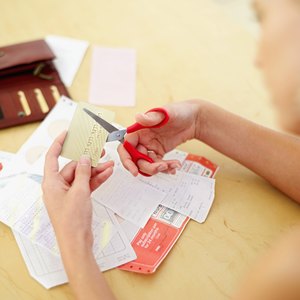
Credit can be a double-edged sword. Used appropriately, you can use credit to help you attain financial goals such as owning a home. Used recklessly, you could amass overwhelming debt that you can’t afford to repay. As you analyze your finances, look for signs that you might be abusing credit.
High Debt-to-Income Ratio
Compare your total debt to your income. The debt-to-income (DTI) ratio compares your total monthly debt payments with your total monthly income, and it serves as a useful yardstick for measuring your overall financial health.
When you apply for credit, a lender will calculate this ratio. Examples of debt include a mortgage, car payment and credit card payments. If your DTI ratio comes in at 36 percent or more, you may have overextended yourself with too much credit.
Calculate your own DTI by adding up your total monthly debt payments and your monthly income. Divide your monthly debt payments by your gross monthly pay and multiply the answer by 100 to arrive at your DTI percentage.
Worry and Anxiety About Debt
Overusing credit often creates significant worry and anxiety as you stress about your level of debt and wonder how you are going to make ends meet. Your finances might get so complicated that you have trouble remembering your debt amount. You may feel confused about how your financial issues occurred and perhaps you avoid talking about it with your spouse or partner.
Making Only Minimum Payments
If you routinely make just the minimum payment due on credit cards, this could be a sign of credit overuse. By only making minimum payments, you will make very little progress in paying down debt because most of the payment applies to interest and not principal. Usually, the reason for making minimum payments is that you have so many credit card balances that you cannot afford to make higher payments.
Making Impulse Purchases Using Credit
Some people find it convenient to put everyday purchases on their credit cards. They may choose this because it helps them stay organized. This method works well if the credit card use is limited to purchases that you would normally be making.
If you start using your credit card for impulse purchases or adding extra items because they are on sale, you could be spending more than you had originally planned. This could cause a problem if you are unable to pay off the balance owing at the end of the month. While you may be able to fit the occasional "extra" thing into your budget, making a habit of treating yourself on a whim can be a sign of credit overuse.
Shuffling Funds to Pay Debt
Once things get out of hand, it’s common to begin shuffling funds around in an attempt to manage the damage. You may deplete savings accounts, cash bonds before maturity, take out new loans, apply for additional credit, transfer balances, skip payments, post-date checks and utilize overdraft protection routinely as you strive to keep your head above water. If you are relying on credit to make purchases that you formerly purchased with cash because you have less money available, that's a big sign of credit overuse.
Late Payments Add Up
As credit woes advance, you may reach or exceed credit limits. Credit card companies may begin revoking your credit cards if you begin experiencing payment problems. Late payment and past-due notices may begin arriving in the mail. You may have to pay late fees on what you owe, and your credit card provider may increase your interest rate.
If your payment is over 30 days late, it will likely be reported to credit bureaus. At that point, your credit rating could lose some points. Eventually, your accounts might hit collection agencies for collection.
References
- Experian: Ask Experian: Should You Use a Credit Card to Make Day to Day Purchases
- PsychCentral: Stressed About Money? 5 Tips to Cope with Debt Depression
- Credit Karma: How Late Payments Can Affect Your Credit
- Federal Reserve. "Consumer Credit - G.19 Consumer Credit Outstanding (Levels)." Accessed Sept. 25, 2020.
- Federal Reserve Bank of New York. "Center for Microeconomic Data." Page 3. Accessed Sept. 28, 2020.
- Experian. "A Look at U.S. Consumer Credit Card Debt." Sept. 28, 2020.
- Federal Reserve. "Consumer Credit - G.19." Accessed Sept. 25, 2020.
- Consumer Financial Protection Bureau. "Data Point: Credit Card Revolvers." Accessed Sept. 28, 2020.
- Charles Schwab & Co. "Good Debt vs. Bad Debt." Accessed Sept. 28, 2020.
Writer Bio
Kathryn Hatter is a veteran home-school educator, as well as an accomplished gardener, quilter, crocheter, cook, decorator and digital graphics creator. As a regular contributor to Natural News, many of Hatter's Internet publications focus on natural health and parenting. Hatter has also had publication on home improvement websites such as Redbeacon.

